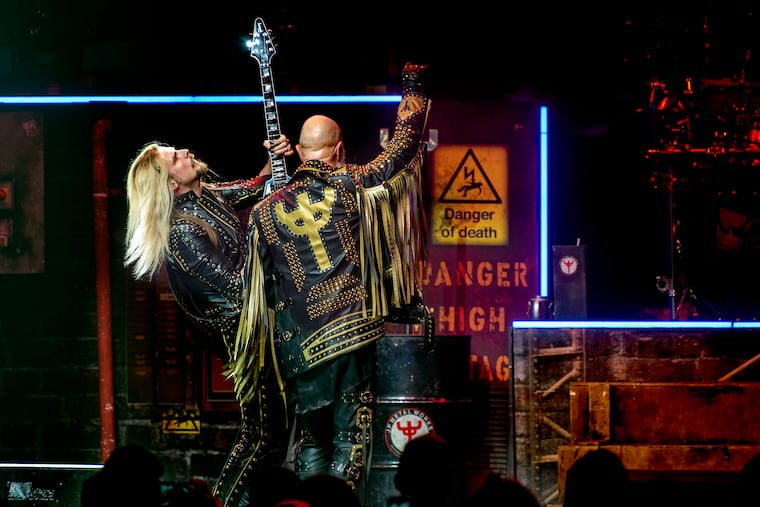Heavy metal legends Judas Priest celebrate 50 years (give or take) at The Met in Philly
Once the group hit the stage Tuesday night they were met by worshipful approval by a packed house of the heavy metal faithful.

Better late than never.
British heavy metal pioneers Judas Priest finally arrived in Philly to celebrate their 50th anniversary Tuesday night at The Met, more than a year and a half after the occasion had passed.
The show was originally slated for September 2020 at the Mann, but … well, we all know what happened in 2020. The date was rescheduled for October 2021, but last September, guitarist Richie Faulkner suffered a near-fatal aortic aneurysm while performing at a Kentucky festival.
Faulkner, 10 years younger than the band itself, recovered following 10-hour open-heart surgery, but his health issues further complicated the already tricky situation in the Priest line-up. In 2018, co-lead guitarist Glenn Tipton had stepped down from touring after a diagnosis of Parkinson’s disease. After an initial decision to tour as a four-piece was met with fan backlash – Judas Priest without its trademark twin-guitar frontline was simply not Judas Priest, regardless of who wielded the Flying Vs – producer Andy Sneap was enlisted.
Despite the health and lineup drama, once Priest hit the Met stage (with Sneap and Faulkner), they were met with worshipful approval from a packed house of the heavy metal faithful. Emerging onto an industrial set designed to look like a metal foundry, complete with belching smokestacks and oil drums, the band opened with “One Shot of Glory,” a martial anthem from their career-reviving 1990 album Painkiller.
The song’s soaring vocals would be challenging for any singer, but 70-year-old frontman Rob Halford still howls and bellows like no other singer. Long known as the Metal God, Halford looked downright Olympian with his tattooed bald pate and bushy gray beard, clad in dense layers of leather and metal studs. He paced the stage with the regal menace of a mad king, snarling after his more eardrum-piercing screams as if defying age to make its move. Only bassist Ian Hill shares the singer’s longevity with the band (drummer Scott Travis joined in 1990, though his blistering drum intro to set closer “Painkiller” makes him an integral member).
Tuesday’s setlist spanned much of Priest’s five-decade history, from a rare performance of “Rocka Rolla,” the title track from their 1974 debut, to “Lightning Strike” from their most recent album, 2018′s Firepower. The dueling axes of “The Sentinel” served as a ferocious reminder of just why the five-piece line-up is so essential, while the epic “Victim of Changes” from 1976′s Sad Wings of Destiny was a rapturous highlight, down to Halford’s closing bloodcurdling shriek.
Halford paused only briefly to thank the “beautiful heavy metal maniacs” for keeping the faith over so many years, but the evening’s most poignant moment came during the encore, when Glenn Tipton rejoined the band for three songs from 1980′s British Steel. While his condition prevents him from playing the band’s more intricate material or shred the way he once could, he was clearly bolstered by the audience’s warm welcome as he hammered out the riffs to “Metal Gods,” “Breaking the Law,” and “Living After Midnight” in his “No Surrender” jersey.
Queensrÿche, another metal band with complicated line-up problems, opened with a 55-minute set clearly designed with the tour’s hardcore (and aging) metal fans in mind. Jettisoning hits like the dreamy ballad “Silent Lucidity” or the poppy “Jet City Woman,” the band instead focused on the technical riffs and dramatic vocals of classic early albums like Rage for Order and Operation: Mindcrime.